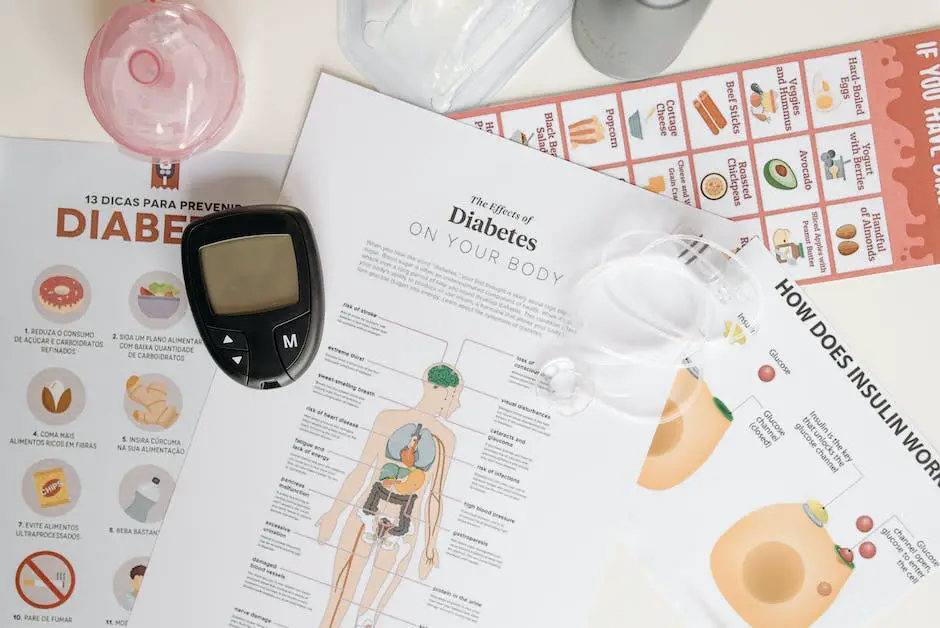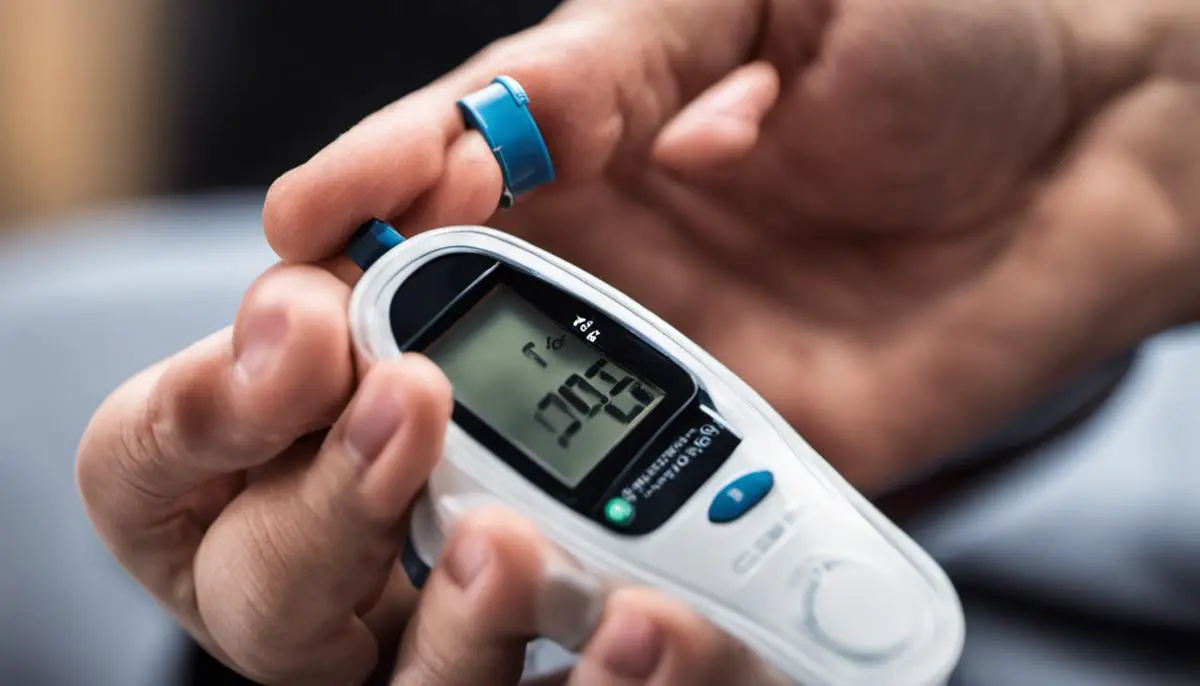Lifestyle changes hold significant influence over the course and management of diabetes, particularly in males. This guide seeks to provide comprehensive information on the nature of diabetes; spotlighting how it uniquely affects men and detailing the profound impact of diet, exercise, and mental health on managing the disease. With diabetes being a steadily rising public health concern worldwide, understanding the disease, the facets it impacts, the lifestyle changes necessary for its control, and the mental influence it exerts is crucial to living a healthy life.
Understanding Diabetes
Understanding Diabetes: A Chronic Health Condition
Diabetes is a chronic health condition that impedes the body’s ability to process blood sugar, or glucose. This inability occurs because the body either does not produce sufficient insulin or resists insulin, leading to high blood sugar levels. Predominantly, diabetes is categorized into two types: type 1 and type 2.
In type 1 diabetes, the immune system attacks and destroys insulin-producing cells in the pancreas, which makes the body unable to produce insulin. This type, though less common, usually surfaces in childhood or adolescence.
In contrast, type 2 diabetes is largely a result of lifestyle factors and genetics, and it frequently develops in adults. It happens when the body is incapable of properly employing the insulin it produces, creating insulin resistance and subsequently high blood sugar levels.
Another type of diabetes is gestational diabetes, which occurs during pregnancy but usually resolves after delivery. Prediabetes is a condition that if not addressed can lead to type 2 diabetes.
Diabetes Symptoms and Complications in Men
Diabetes symptoms can include frequent urination, excessive thirst, fatigue, blurred vision, wounds that heal slowly, and unexplained weight loss. In men, diabetes can additionally result in erectile dysfunction, reduced strength, and low testosterone levels. Men with diabetes are also more likely to experience nerve damage in the feet, which can lead to foot complications.
Chronic high blood sugar levels can lead to severe health issues like heart disease, stroke, kidney disease, vision problems and nerve damage, which is why it is important to recognize the symptoms early and manage the condition properly.
Importance of Lifestyle Changes in Managing Diabetes
Lifestyle changes are fundamental in managing diabetes and preventing complications. Exercise is one vital aspect as it helps control weight and increase insulin sensitivity. Physical activities like jogging, biking, swimming, or even brisk walking can make a substantial difference.
A healthy diet is another crucial element. Incorporating fruits, vegetables, whole grains, lean proteins, and healthy fats while limiting high-carb and sugary foods can help regulate blood sugar levels. Portion control and regular meal times further assist in preventing blood sugar spikes.
Moreover, regular monitoring of blood sugar levels allows individuals with diabetes to understand their body’s response to different foods and adjust their diet or medication accordingly. Healthcare providers can help devise a personalized plan based on specific needs and goals.
Mental Health: A Key Component in Diabetic Management
Paying attention to mental health is just as crucial as maintaining physical wellbeing for diabetic men. It is quite common for individuals with diabetes to experience stress, anxiety, or depression. Turning to therapies and support groups can provide beneficial coping mechanisms and essential emotional support during these times.
The task to implement and uphold these lifestyle changes may be a challenge. However, with perseverance, these efforts enable effective diabetes management, improve overall quality of life, and diminish the risk of potential complications. Garnering support from healthcare providers, family, and support groups can aid in easing the transition and foster sustainable change.

Dietary Changes for Diabetic Men
Diet: The Cornerstone of Diabetic Management
For patients with diabetes, their dietary habits significantly influence their condition since the food they eat directly affects their blood glucose levels. Diabetic men should espouse a well-balanced, nutritious diet comprising predominantly lean proteins, whole grains, fruits, and vegetables. A diet abundant in dietary fiber promotes gut health and slows down the uptake of sugar into the bloodstream, thus helping to prevent rapid fluctuations in blood glucose levels.
It’s prudent to sidestep foods loaded with added sugars such as sugary beverages, sweets, and processed items. Opt for natural sugar sources like fruits instead. Also, it’s critical to restrict the intake of saturated and trans fats, commonly found in fatty meats, fast food, baked products, and full-fat dairy items. These unhealthy fats can ramp up cholesterol levels and heighten the risk of cardiac diseases, which are a significant concern for individuals with diabetes.
Carbohydrate intake is another area where diabetic men must exercise caution. This is because carbs are metabolized into glucose, which escalates blood sugar levels. Thus, it’s vital to consider not only the quantity but also the quality of carbs consumed. Whole grains and complex carbohydrates are the better choice as they take longer to digest in the body, ensuring a slower and more controlled rise in blood sugar.
Portion Control and Meal Timings
Equally essential to what one eats is how much and when they eat. Regular mealtimes and portion control play a central role in maintaining a balanced blood sugar level. Skipping meals or varying meal times can cause blood sugar levels to fluctuate, potentially leading to hypoglycemia or hyperglycemia. Therefore, diabetic men should aim for regular, well-spaced meals to help maintain steady blood glucose levels throughout the day.
Portion control is vital, as larger portions often lead to overeating and weight gain, two factors that can worsen diabetes symptoms. Utilizing visual cues can assist with portioning out meals properly. For example, half the plate should be dedicated to non-starchy vegetables, a quarter to lean protein, and the remaining quarter to whole grains.
Impact of Certain Foods on Blood Sugar Levels
Individual responses to different types of food can vary. Some people might experience a quick rise in blood sugar levels after consuming certain foods, while others may not. It is beneficial to monitor blood glucose levels before and after meals to distinguish how different foods impact individual blood sugar levels.
Recommendations for Diabetic-friendly Meals
A meal planning strategy popular with many diabetic men is the plate method. Using this approach, half of the plate is filled with non-starchy vegetables, such as spinach or broccoli. One quarter of the plate should have a lean protein such as chicken, and the remaining quarter should contain a serving of whole grains or starchy vegetables like potatoes.
For breakfast, a whole grain cereal or oatmeal, paired with fresh fruits and low-fat milk, is a healthy option. Lunch and dinner can include grilled chicken or fish, paired with brown rice and a side of vegetables. Small, healthy snacks like fruits, nuts, and low-fat yogurt can be eaten between meals. Drinking plenty of water and limiting refined sugars and sugary drinks helps maintain hydration without adding to blood glucose levels.
Adapting Lifestyle for Better Diabetes Management
Adapting a well-rounded lifestyle is the key approach for men when managing diabetes. This essentially includes adhering to a balanced, regular meal plan and understanding how certain foods can affect your blood glucose levels. The combination of disciplined eating habits, consistent physical activity, and the right medication forms the building blocks for an effective diabetes management plan.

Exercise and Physical Activity
Understanding the Impact of Regular Physical Activity on Blood Sugar Control For Male Diabetics
For diabetic men, regular physical activity is not just about fitness; it’s a matter of blood sugar control. It helps to lower blood glucose levels, enhances insulin efficiency, aids in weight management, and also curbs the risk of heart disease, a common concern among diabetics.
The simple act of engaging your muscles during exercise uses glucose as fuel, this helps in slashing excessive blood glucose levels, a critical aspect of diabetes management for men. Furthermore, physical activity primes the body to use insulin more proficiently, resulting in lesser insulin needed to process the same amount of glucose. This leads to a healthier equilibrium of blood sugar levels in the long run.
Regular Exercise and its Benefits
Regular exercise can provide a wealth of benefits for men with diabetes. Aerobic activities such as walking, swimming or cycling can reduce insulin resistance and help the body to more effectively use glucose and insulin. Resistance training, like weightlifting, also plays a part in helping manage blood sugar levels by increasing muscle mass. The more muscle mass you have, the more glucose your body can burn for energy instead of causing spikes in your blood sugar.
Moreover, regular exercise provides cardiovascular benefits, reducing the risk of heart complications that are typically higher in diabetic individuals.
Choosing Suitable Types of Exercises
Knowing the best types of exercises for diabetic men is important. For those starting a new exercise regimen, it can be beneficial to start with light activities such as brisk walking, yard work, or light housekeeping. Gradual progression can lead to more moderate aerobic activities like jogging, swimming, cycling, or playing a sport. Additionally, resistance training should be included at least two days a week.
Functional movements like squatting, pushing, and pulling are beneficial as they mimic everyday activities and use multiple muscle groups at once. It’s important that the type of exercise chosen is enjoyable and sustainable to promote consistency.
When to Exercise?
The best time of day to exercise can vary based on individual lifestyle and blood sugar levels. However, it’s usually recommended to avoid exercising right before bedtime, as it may lead to difficulty sleeping. Test your blood sugar before and after workouts to learn how your body responds to exercise. Adjust your meal plan or medication schedule as necessary to prevent hypoglycemia (low blood sugar) during or after physical activity.
Precautions and Considerations
Before embarking on a new fitness regimen, it’s advisable for men with diabetes to consult their healthcare provider. Exercise can impact medication effectiveness and blood glucose levels, so it’s important to take into account individual health status.
Be mindful of foot care, since diabetes can lead to a loss of sensation in the feet. Choose comfortable, well-fitted training shoes and inspect your feet daily for blisters, cuts, or sores to prevent serious foot problems.
Remember to stay hydrated and adjust your diet to your exercise routine which may require a snack before or after exercise to maintain blood sugar levels. Refrain from exercising if ketones are present in the urine, as this may lead to a dangerously high level of acids in the blood.
Adopting a regular physical activity routine can dramatically enhance both the quality of life and blood sugar control for men diagnosed with diabetes when precautions and considerations are taken into account.

Psychological Impact and Stress Management
Prioritizing Mental Health in Diabetes Management
For men managing diabetes, their journey goes beyond just physical care and steps firmly into the realm of mental health. The importance of mental well-being cannot be overstressed as fluctuations in emotional states such as stress, anxiety and depression can significantly affect blood glucose levels, thus leading to poorer control of the disease. Elevated stress can cause a rise in blood sugar levels and trigger unhealthy habits like poor diet, lack of exercise, neglect in monitoring blood sugar levels and not taking prescribed medication.
Potential Stressors for Diabetic Men
There are numerous potential stressors that can affect diabetic men. Some of the most common include fear of complications, the burden of managing the disease, financial stress related to the costs of care, feelings of guilt related to perceived failures in self-care, and fear of hypoglycemia. Social factors such as relationship stress, stigma related to the disease, and balancing diabetes management with work and family responsibilities can also lead to high stress levels.
Coping Strategies for Diabetic Men
Developing effective strategies to cope with diabetes-related stress is a vital component of successful disease management. Regular exercise not only helps to maintain blood sugar levels but also reduces stress. Following a balanced diet, taking prescribed medications, having a routine check of blood sugar levels, and ensuring regular sleep patterns are crucial. In addition, practices like mindfulness, meditation, and progressive muscle relaxation can help in stress reduction. Another key strategy is setting realistic goals for diabetes management and recognizing the efforts put in to reach them rather than focusing on shortcomings. It’s also beneficial to learn to share concerns with others and seek help when needed.
Importance of Support Systems
Coping with diabetes is a lifelong journey, making the support of family, friends, and health care professionals essential. A strong support system can provide emotional comfort, motivation, and practical help in maintaining a healthy lifestyle. For example, participating in activities together, like cooking a healthy meal or going for a walk, can not only make self-care activities more enjoyable but also improve adherence to healthy behaviors.
Therapeutic Approaches
There are several therapeutic approaches that can assist in managing the psychological impact of diabetes. Cognitive-behavioral therapy can help diabetic men learn to identify and change patterns of thinking that lead to negative emotions and behaviors. Motivational interviewing can support individuals in finding their own motivation for making lifestyle changes, while group therapy or peer-support groups can provide a sense of community and mutual understanding. The therapeutic relationship with a psychologist or counselor can also provide validation of the emotional challenges associated with diabetes and tools for managing these challenges effectively.
Takeaway
The impact of diabetes on a man’s life extends beyond physical health — it also encompasses mental wellbeing. Therefore, attending to psychological issues is a necessary part of diabetic self-care. With a mix of individual efforts, social support, professional help, and therapeutic approaches, this complex and chronic disease can be successfully managed, promoting a better quality of life.

Adapting to a new lifestyle might initially seem challenging to men who are diagnosed with diabetes; however, over time, it becomes evident that these changes can substantially enhance overall health and well-being. It is crucial to remember that there can be no one-size-fits-all approach to handling diabetes; thus, individual differences must always be taken into account. Diligence in managing diet and exercise routines, combined with psychological balance, can significantly aid in controlling the disease, leading to a productive and fulfilling life. While it is commendable to arm oneself with knowledge, seeking expert advice and guidance when necessary is equally essential.
